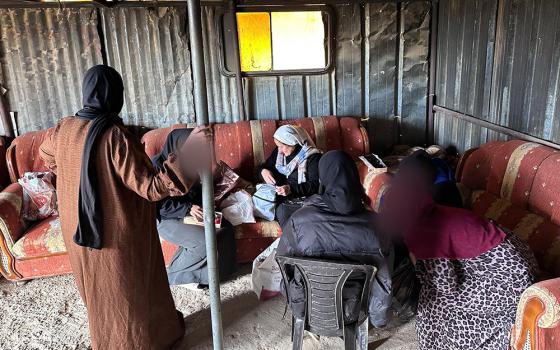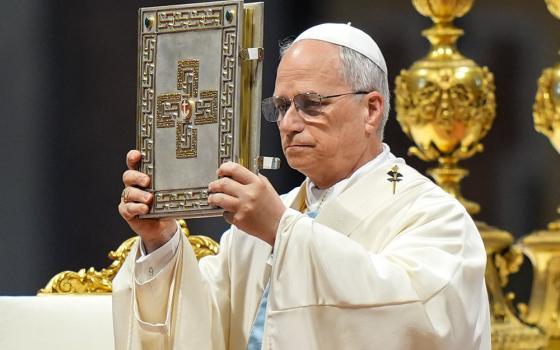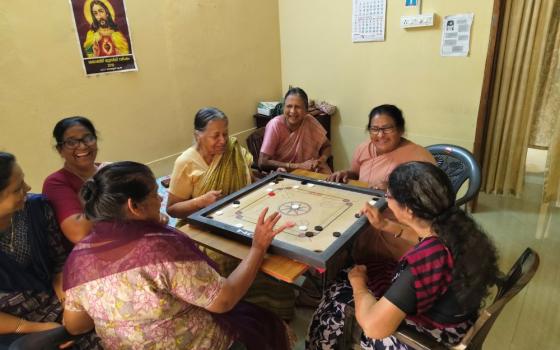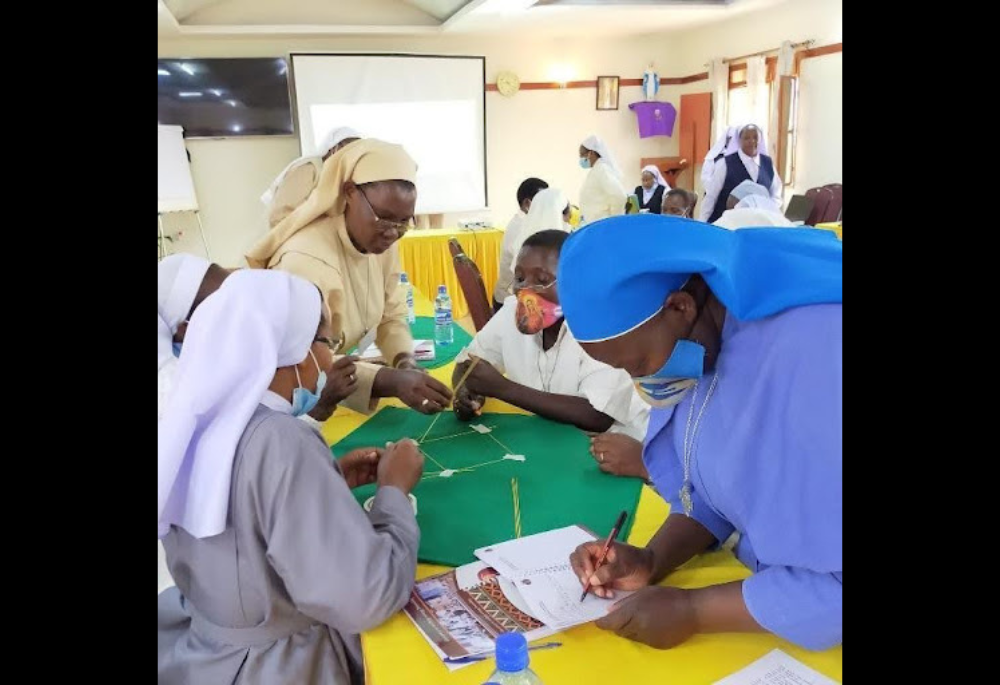
Participants take part in a program training activity on teamwork during the Professional Development for Congregational Leaders program. Designed by African leaders for African leaders, the program recognizes the realities of religious leadership in Africa and offers women religious the skills to lead with faith, resilience and collaboration. (Courtesy of Catherine Cingii)
Leadership is often seen as a position of authority, but for me, it has become something far deeper. As a woman religious and member of the Institute of the Holy Trinity Sisters, my leadership journey has been shaped by blessings and challenges. One of the greatest blessings has been walking closely with others, listening, mentoring and witnessing transformation through prayer and community. Leading has allowed me to grow alongside those I serve, to discern God's will in communion with others, and to experience the quiet power of faith in action.
At the same time, this journey has brought real challenges. Decision-making can be lonely. Change often meets resistance. Balancing tradition with emerging needs requires courage, patience and humility. Leading in today's dynamic world means more than managing tasks; it requires navigating organizational change, building unity within diverse communities, and responding to the growing pastoral and social needs of the people we serve.
Despite years of experience in religious life, I reached a point where I realized I needed more. One moment stands out: I was facing a team entrenched in internal conflict and tensions that my prayers and good intentions alone couldn't resolve. I felt inadequate, aware that I lacked the tools to guide the structures and the hearts entrusted to me. It was a humbling and formative experience that led me to seek deeper formation, which I found in the Professional Development for Congregational Leaders program.
This was not just another training. It was a turning point. Designed by African leaders for African leaders, the program recognizes the unique realities of religious leadership on our continent. Under the guidance of the Centre for Leadership and Management at Tangaza University, the program offers women religious the skills to lead with faith, resilience and collaboration.
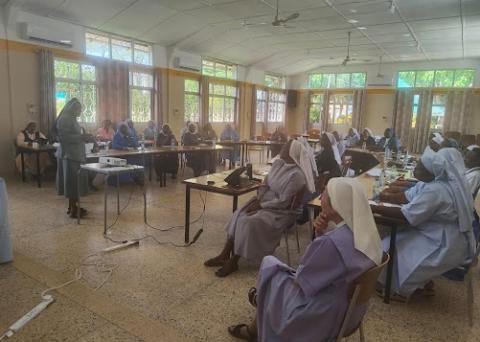
A program training activity on teamwork during the Professional Development for Congregational Leaders program (Courtesy of Catherine Cingii)
Before this program, I often equated leadership with authority and results. I worked hard, but I also felt overwhelmed, especially by the emotional and spiritual demands that come with guiding others. I carried others' burdens silently, often neglecting my own inner needs. The pressure to appear strong made it difficult to admit when I was struggling. I avoided difficult conversations, hoping to preserve peace, not realizing that silence sometimes held back the growth of my team.
This program challenged those assumptions. I vividly remember a reflective exercise on values and blind spots. It was humbling to see how my discomfort with conflict limited honest dialogue and accountability. I began to understand that leadership requires emotional courage and spiritual maturity, that avoiding discomfort can cost more than facing it. This realization marked a turning point. I now see leadership not just as a role, but as a continual invitation to grow, to listen deeply, and to lead with clarity and compassion.
Leadership is not a solitary path. Through the power of collaboration, I witnessed how inclusive spaces allow others to rise. One sister's words have stayed with me: "Leadership is creating spaces for others to rise." Whether in small group discussions or community projects, I have seen firsthand how fostering teamwork leads to transformation.
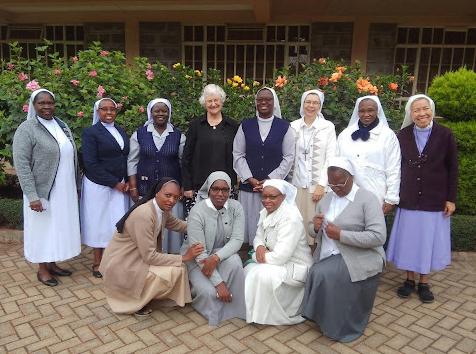
A program training activity on teamwork during the Professional Development for Congregational Leaders program (Courtesy of Catherine Cingii)
Leadership is also not separate from faith; it is grounded in it. There have been moments when prayer and discernment were the only things that gave me clarity. I recall a particularly difficult decision involving our community's outreach program. Resources were scarce, opinions divided, and the pressure to act swiftly was intense. Instead of hurrying, we paused for collective prayer and reflection. In that silence and honest dialogue, clarity gradually emerged. We found a path forward that honored both our values and the people we serve.
As a fellow program participant once said, "When God is at the center of our decisions, everything falls into place." I have found this to be true. Discernment is not a delay, it is leadership grounded in trust.
My journey did not end after graduating from the program. Serving as a facilitator has been humbling and enriching. Walking alongside others as they grow in confidence and self-awareness has reinforced my belief that leadership is a shared journey. I have seen sisters overcome self-doubt, find their voice, and step into leadership with renewed clarity. Others have learned to face conflict not with fear, but with compassion and wisdom.
One sister who once questioned her leadership role now guides her community with quiet strength and deep spiritual grounding. These transformations remind me that growth is always possible within individuals, communities and the church. Facilitating their journeys continues to shape mine. It has taught me that true leadership emerges when we lead from within, rooted in faith, openness and the courage to keep growing.
Through the power of collaboration, I witnessed how inclusive spaces allow others to rise. One sister's words have stayed with me: 'Leadership is creating spaces for others to rise.'
Today, I lead with renewed purpose. Within the Holy Trinity sisters, I strive to foster collaboration, faith and compassion. But leadership does not end with me. Empowering others is at the heart of lasting change, when women religious are equipped to lead with confidence, shaping vibrant communities and strengthening the mission of the church in Africa.
As one sister shared, "Your leadership inspires us to be better versions of ourselves." For me, there is no greater affirmation and no greater responsibility. Leadership is not a destination; it is a lifelong journey rooted in faith, shaped by courage and strengthened by the people who walk alongside us.
Leadership is not reserved for those with titles or authority. It begins within, through self-awareness, faith and the willingness to grow. When we lead with humility and empower others, we create communities where everyone can thrive.
Advertisement





